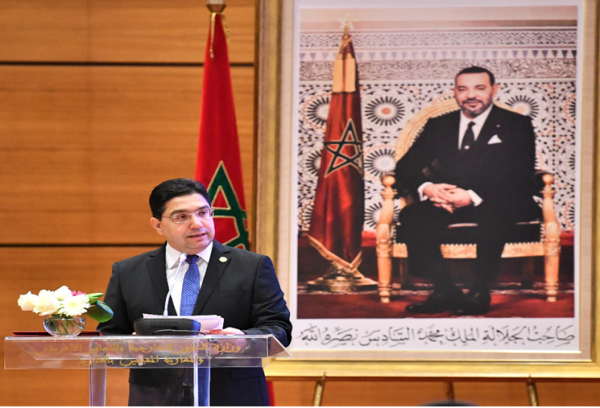
On the occasion of a high-level meeting held on 30th of September 2020, by the United Nations to celebrate the 25th anniversary of Beijing Declaration on women’s rights, Morocco expressed the wish that inequalities between women and men become a thing of the past, stressing that the Kingdom, under the leadership of His Majesty King Mohammed VI, has made of the promotion of gender equality a “proactive strategy”.
Morocco’s wish is that inequalities between women and men will belong to another time, said Minister of Foreign Affairs, African Cooperation and Moroccans Expatriates Mr. Nasser Bourita, in a pre-recorded message broadcast during this virtual meeting.
Mr. Bourita recalled that the Beijing conference marked a turning point in the international agenda for equality between women and men, in that the Declaration and the Plan of Action adopted on this occasion are on gender equality, what the 2030 agenda is to sustainable development, namely an action program, a catalyst for cooperation and an instrument for mobilization.
“With the difference that the Sustainable Development Goals (SDGs) are also carriers of an agenda in favor of gender equality and the empowerment of women since it is not only a separate objective (SDG5) but also an integral part of each of the 17 SDGs,” the Minister noted.
Gender equality is transformational in that it crosses all the challenges of our time in a transversal way, he said, adding that its centrality lies in its multiplying power which makes it “the barometer of progress and development.” The commemoration of this anniversary is above all a moment of evaluation, in that “the results are mixed”, he stressed.
“Certainly, significant efforts have been made. However, no country can claim to have achieved total equality. Discrimination still exists. Disparities remain. Structural barriers resist and stereotypes are legion while the means deployed remain below the objectives set out,” Mr.Bourita explained.
“The Coronavirus pandemic has accentuated this reality, further weakening the situation of women and girls. It recalls that the rights of women are a permanent conquest and that these same rights are the first to be called into question in the event of a crisis”, he said.
Referring to the achievements made by Morocco in this area, the Minister underlined that His Majesty King Mohammed VI has made of the promotion of gender equality a “proactive strategy”, which emanates from a conviction that gender equality is a “fundamental human right, a legal imperative and a social and economic requirement”.
He recalled, in this regard, that since the enthronement of the Sovereign, a large number of legal advances have been made, including the 2004 Family Code“Moudawana”, the lifting of reservations to the Convention on the Elimination of All Forms of discrimination against women in 2008, as well as the adoption in 2011 of a Constitution which enshrines equality between women and men in all areas.
Moreover, there are other laws that have been adopted, including those relating to equal access for women to collective land (Soulaliyates) and the adoption of Law 103.13 on violence against women, which criminalizes all forms of violence and establishes a real mechanism for care for victims of violence, Mr. Bourita said.
He added that this dynamic in favor of equality has been reinforced by the adoption of government strategies such as the Governmental Plan for Equality, which constitutes a framework for the convergence of actions aimed at promoting women’s rights and their integration into public policies.
The Kingdom’s pioneering leadership in Gender Responsive Budgeting (GRB) ensures the transition from de jure equality to de facto equality, he noted, adding that the revision of the organic finance law includes the issue of gender in each step of the budgeting process. Morocco even established in 2013 a Center of Excellence for GRB, the first of its kind at the African and Arab levels, which has become a model of South-South cooperation, he pointed out. (End)
